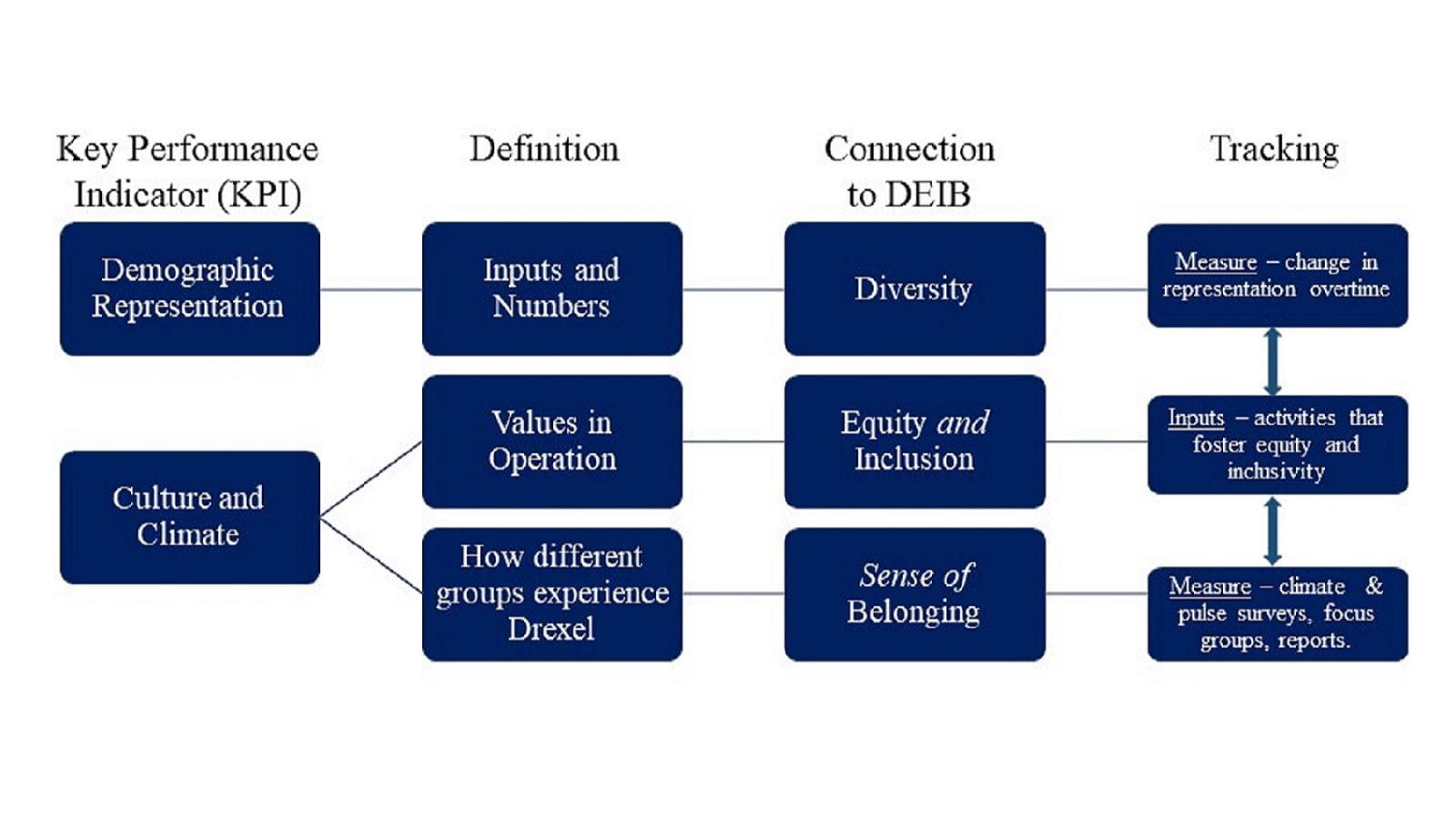Strategic Plan Alignment

Discussion Links Drexel’s Anti-Racism Efforts and Its New Strategic Plan

Towards an Anti-Racist Drexel

In 2021, Drexel University’s Anti-Racism Task Force (ARTF) released its final report, Toward an Anti-Racist Drexel [PDF], which outlined 64 specific commitments the University pledged on its journey to become an anti-racist institution. The commitments are grouped into two macro themes: Demographic Representation, and Culture and Climate, which are then further grouped into six broad themes.
These commitments, detailed below, align with the Culture of Equity imperative, one of the six strategic imperatives and initiatives in the Drexel 2030 Strategic Plan.
Commitments: Demographic Representation
Many of the recommendations focused on an important outcome: increasing the representation of, and cultivating a sense of belonging for, Black/African American faculty, professional staff, and students at Drexel. These four ARTF committees focused explicitly on recruitment: i) Admissions and Prospective Students; ii) Graduate and Doctoral Student Life; iii) Faculty Recruitment and Retention; and iv) Professional Staff Recruitment and Retention. These recommendations are intended to increase representation by addressing potential implicit biases in systems, policies, planning groups, leaders and leadership groups, and in how we recruit and advance students, faculty and professional staff.
There were some common themes in the overall need for coordinated and transparent recruitment processes, as well as some nuances in how the four committees above approached recommendations for students, faculty and professional staff.
Students
The Admissions and Prospective Student Committee recommended that the University enroll a critical mass of Black/African American undergraduate and graduate students with the goal of increasing the percentage of these students over a five-year period ending in 2026 and moving closer toward having Drexel’s student population reflect the representation of Black/African Americans in the United States. The Doctoral and Graduate Student Life committee also recommended that broad, standardized recruitment processes be established to attract students who identified as Black, Indigenous, and people of color. The recommendation to increase the representation of Black/African American students was also mentioned in the Faculty Recruitment and Retention Committee report. Based on the recommendations, University commitments to increase the representation of Black/African American undergraduate and graduate students include:
- Retaining the test-optional admissions policy to mitigate barriers to the recruitment of Black/African Americans due to systemic and structural disparities that persist. This pilot will run until 2023 and will be reassessed for effectiveness.
- Requiring DEI awareness, unconscious bias and cultural competency training for recruitment teams and student ambassadors.
- Identifying and establishing formal memoranda of understanding (MOU) with targeted middle and high schools to provide coaching to students to and through college.
- Establishing articulation agreements with historically Black colleges and universities (HBCUs), at the undergraduate and graduate levels.
- Investigating, identifying and implementing preadmission/community college transfer programs with feeder community colleges.
- Providing transparent actual pricing information.
Faculty
The Faculty Recruitment and Retention Committee recommended that the University establish a goal to increase the representation of Black/African American faculty by 10% during the five-year period from 2021-2026 by establishing inclusive and equitable hiring practices that attract Black/African American faculty. This recommendation arose because Black faculty only constituted about 4.1% (51) of the 1,241 full-time faculty at Drexel in 2020. The Graduate and Doctoral Student Life Committee also stated the need for an increase in the hiring of Black/African American and Latino faculty, as did the Undergraduate Student Life Committee. Based on the recommendations, University commitments include:
- University leadership making a public commitment, stating a goal and the need to prioritize the recruitment and retention of more Black/African American professors.
- Developing and implementing a coordinated University-wide faculty recruitment process that includes a centralized data collection requirement for every faculty search.
- Developing a five-year plan for hiring, including metrics for evaluation and accountability.
- Developing and implementing a coordinated faculty recruitment process that is clear and consistent across units, with accountability measures. Integrating best practices in inclusive faculty hiring into the recruitment process.
- Appointing or designating administrator(s) for academic units to facilitate the faculty hiring process.
- Re-establishing and funding an Africana Studies department.
Professional Staff
A review of internal data showed that 29% of professional staff at Drexel were people of color, who were disproportionately underrepresented in exempt, managerial, and higher EEO grade roles, and overrepresented in non-exempt roles. To mitigate gaps in representation, particularly in exempt roles, the Professional Staff Recruitment and Retention Committee report included the following recommendations that have transitioned into University commitments:
- Creating a recruitment policy that: outlines best practices and strategies that center diversity, equity and inclusion, contains a comprehensive process spanning the entire recruitment process, and is consistent with Drexel's core values.
- Tapping into the local West Philadelphia talent by increasing hiring and professional development of the local community.
- Adding “Equity Partners” to assist with DEI strategic goals, culture of equity shift, programming, education and ensuring equitable hiring practices within the unit.
- Developing internal talent to alleviate disparity gaps that persist regarding the advancement of people of color.
Overall, the recommendations for increasing representation of Black/African American students, faculty and professional staff highlighted the need for coordinated and intentional processes, explicit policies where appropriate, and specific strategies unique to each of these stakeholder groups. The committee recommendations underscored the fact that while it was important to create access through recruitment strategies, it was equally important to have a campus environment that was welcoming to Black/African Americans who were both members of the Drexel community and neighboring communities.
Commitments: Culture and Climate
While many recommendations addressed increasing representation, as discussed above, many more recommendations focused on Drexel's culture (values in operation including systems, policies, processes, and structures, and artifacts, both visible and invisible) and climate (how Black/African American and people of color experience the organization). These recommendations highlighted ways in which Drexel's culture and climate could be enhanced by centering the needs of Black people while simultaneously highlighting ways in which these recommendations would be beneficial to the entire University.
Recommendations in the culture and climate category are grouped into five main themes: fostering a culture of anti-racism through learning; policies and systems; adequate staffing and resource allocation; faculty diversity and curriculum revisions; and business practices and community engagement.
Although the Leadership, Learning, and Education Committee was specifically charged with focusing its recommendations on the learning and development of the entire Drexel community, all 11 ARTF committees highlighted the need for anti-racism, anti-bias and DEI education. Spotlighted by this committee was the need to “Weave Anti-Racism through all facets of the University's systems and structures and acknowledge harm and disparities to build learning opportunities in support of change, for example, by including systemic racism as one of 'society's most pressing challenges' referenced in our strategic plan.” These recommendations stressed the need for educational opportunities that enhance: faculty competencies in anti-racist, inclusive, and equitable pedagogies; cultural competencies of University leaders and board members; DEI education for professional staff; and education for students. Furthermore, recommendations focused on establishing a baseline for DEI education for all members of the Drexel community, in addition to specialized foci that addressed specific competencies in teaching, supervising, and collaborating across groups and communities at Drexel. Based on the recommendations, the University commitments include:
- Enhancing racial literacy by creating learning opportunities at the individual and organizational levels through dialogues, and assigned workshops, films and articles.
- Mandating anti-racism training for all members of the University community.
- Leveraging faculty expertise to provide guidance and options for culturally responsive counseling and therapy.
- Impressing upon leaders the need to prioritize anti-racism and DEI learning, to model behaviors, and maintain accountability.
- Identifying solutions to improve the student experience for marginalized, particularly Black and brown, communities at Drexel by implementing rigorous anti-bias and anti-racist training in undergraduate curriculum and corporate training for co-op placements.
- Creating an inclusive employee experience that is supported by conditions that reflect and reinforce anti-racism efforts.
- Establishing a mental health-focused call center.
- Facilitating group sessions focused on mutual racial identity concerns that include students, faculty and professional staff to share in safe spaces.
- Launching a social media campaign that draws attention to racial trauma and destigmatizes stress and adversity across the University.
- Offering supplier inclusion training and awareness to members of the University community to highlight business opportunities and partnerships with the local minority-owned business community.
- Developing protocols and training for faculty engaged in community-facing research with clear anti-racist principles and values.
Similar to fostering a culture of anti-racism through learning and education, the need for an examination of policies and systems permeated all 11 ARTF committee recommendations, with the Policies and Procedures Committee focusing on both the University's "philosophical and technical approach to policies and procedures as well as the content of existing University policies and procedures." (Policies and Procedures Committee) The focus here was to "change policies and systems through a process that is intentional and visible when needed." Policy recommendations from this and other committees transitioned to the following University commitments:
- Defining key terms essential to the University's anti-racism agenda.
- Ensuring significant representation of Black community members during the development and enforcement of policies.
- Maintaining transparency in the University's anti-racism efforts through communication.
- Committing to regular policy reviews using an equity lens.
- Transforming the Program Alignment and Review (PAR) process to include an equity audit.
- Establishing policies, processes and initiatives throughout the faculty lifecycle that ensure the retention of Black faculty.
- Conducting in-depth analyses to uncover potential biases within specific promotion and tenure processes.
- Developing and fostering ongoing mentoring mechanisms for Black faculty.
- Tracking and reporting data related to faculty workload and performing a pay equity audit.
Nearly all 11 ARTF committees recognized the need to "adequately staff offices that set the institutional culture and/or are designed to protect and support people of color: Office of Equality and Diversity, Student Life, Counseling and Health Services, Office of the Provost, University Communications, etc." To that end, the Faculty Recruitment and Retention, Professional Staff Recruitment and Retention, Trauma and Mental Health Supports, and Policies and Procedures committees identified specific positions that ought to be created and/or prioritized to ensure that these offices had the resources needed to implement the recommendations. The University commitments based on the recommendations include:
- Hiring Black and brown faculty and professional staff in counseling and therapeutic spaces to ensure equity and consistency of service and enhance trauma and mental health services for students, faculty and professional staff.
- Hiring a Vice Provost for Diversity, Equity and Inclusion whose focus is on faculty diversity, inclusion and belonging.
- Staffing the Office of Equality and Diversity appropriately to effectively address the needs of the community.
- Adequately resourcing and staffing offices that are dedicated to community engagement and community-facing work.
- Improving the experiences of Black, Indigenous, and people of color on Drexel's campus through existing programs like the LeBow BRIDGE (Build Relationships in Diverse Group Experiences).
- Investing in and uplifting Black student organizations.
- Creating funding opportunities to address specific needs, especially during instances of emergency.
Adjoined by the recommendations from the Academic Review and Curriculum Committee, the theme of faculty diversity and curriculum revisions aims to “Build more diversity in the faculty and revise the curriculum in ways that reflect student interest and advance the University's mission and strategic plan.” Recommendations from this and other committees that are University commitments include:
- Establishing a committee that would provide a roadmap for creating, implementing and reviewing anti-racist curricular standards across departments so they can perform anti-racism audits.
- Examining core curriculum to begin addressing need for anti-racist pedagogies across departments and eliminate inequalities in academic success.
- Peer reviewing syllabi to ensure content is inclusive and racially relevant.
- Fostering equity and creating opportunities for Black students to participate in higher education by adopting curricula that reflect the history and culture of Black people.
- Adding DEI-related requirements to accompany math, science and English general education requirements.
- Establishing and articulating a focus on social justice as part of the University's strategies to increase diversity among faculty.
- Adding a Drexel Student Core Competency focused on diversity, equity and inclusion that includes anti-racism and cultural competence.
- Offering ongoing anti-racism pedagogy training.
- Creating a culture of inclusion and belonging for community building, resource sharing, and accountability from onboarding throughout the faculty life cycle to improve retention outcomes for Black faculty.
Two ARTF committees, Business Practices and Community Engagement, were convened specifically to examine Drexel's practices in these areas and provide recommendations. Their emphasis was to “ensure that our institutional practices around business and community engagement create access and opportunity for neighbors in a way that is genuinely anti-racist and does no harm” in our education, research, and business partnerships. Recommendations highlighted ways in which the University can continue to work with the Black community in West Philadelphia and the broader Philadelphia community by adopting an equity and anti-racism approach. The University commitments based on these recommendations include:
- Reassessing and reimagining community-engaged teaching, research and learning approaches for projects in partnership with the Black community in West Philadelphia; co-developing with the community a vision of what anti-racist engagement would be to promote a culture of respectful and equitable community engagement.
- Undertaking a community planning process to define a shared vision for an anti-racist community engagement approach to ensure equity in practices and programs that directly impact the community in which it resides. This should include an examination and accounting of Drexel's impact on the neighborhoods around the University's campus.
- Championing access to equitable education opportunities for students residing in West Philadelphia, including deepening beneficial partnerships with Promise Zone schools and developing an intentional approach to recruiting and supporting local students at Drexel.
- Publicly acknowledging historical and present-day impact of University expansion, policies and practices on its surrounding historical Black communities, and co-develop a reconciliation plan with community.
- Reimagining public safety at Drexel, including an external review of DUPD and an increased investment in mental health supports for the campus community. Invest in a comprehensive campus safety model to mitigate practices that make community residents susceptible of profiling and police misconduct.
- Examining practices in real estate development that put the community at risk for displacement due to increasing housing cost burden.
- Developing a “Good Neighbor Initiative” with Student Life to address off-campus student attitudes and behaviors.
- Considering welcoming programming and community access to on-campus facilities, including the Library and Recreation Center.
- Creating clear and welcoming entry points on Drexel's website for the community to engage with University, with a full inventory of community initiatives on campus.
- Increasing direct spending with diverse and local businesses.
- Removing contracting process barriers to local and minority-owned business participation.
- Collaborating and partnering with community organizations to enhance access to opportunities for partnerships with local businesses.
Monitoring Success
Drexel is committed to improving systems to monitor and publicly report representation data, and to regularly survey students, faculty, and professional staff to assess climate and examine trends. The University will also qualitatively assess yearly its progress toward each of the 64 commitments.

Undergraduate Student Life
Graduate and Doctoral Student Life
Admissions and Prospective Students
Faculty Recruitment and Retention
Academic Curriculum and Program Review
Trauma and Mental Health Supports
Professional Staff Recruitment and Retention
- Recommendations: Education, Recruitment, Retention [PDF]
- Narrative Recommendations [PDF]
- Additional Recommendations [PDF]